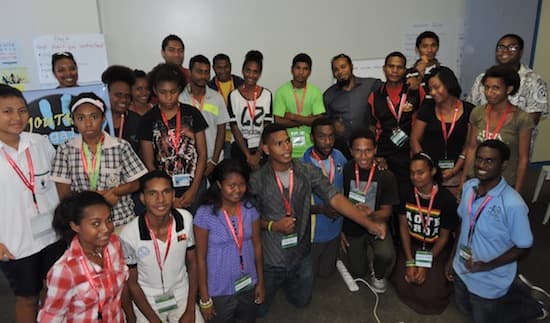What is Development?

This essay is part of a presentation made by Eddie Tanago for ACT NOW! at this week's Youth Smart Workshop organised by the Youth Against Corruption Association. The photo above shows some of the workshop participants.
What is development?
To answer this question we must understand our background/our history/our roots! Who we were as a country and region, in the past, how changes occurred and why they occurred.
As Father Barr has written:
"Pacific Island societies survived for hundreds of thousands of years prior to European contact through indigenous forms of governance and appropriate forms of technology and complex social structures that promoted sharing and caring.
"Colonisers, Colonial administrators, Christian missionaries, traders began introducing other systems, religious beliefs and cargo around the time when Europe was going through major radical changes in the form of religious reformation and scientific enlightenment. These changes gave birth to capitalist economies, the industrial revolution, urbanization and what is know today as economic development.
"The newly discovered Pacific Islands (and African and American) colonies became the source of raw materials to build the home countries of these colonizers. In order to have access to and obtain these raw materials, there had to be new rules and regulations imposed. They imposed a new form of government, changed our traditional spiritual beliefs, introduced their education system and introduced a cash-based economic life.
The impact of this race for raw materials was that our societies were drastically changed. Our complex traditional structures were altered rather rapidly.
One highly prominent Papua New Guinean Scholar, the Late Sir Benard Narokobi described these changes in this manner. I quote:
"The entire concept of the country, the idea of the nation state, is an act of violence and really an act of hostility against native village independence and village autonomy. You have 700 or 800 language groups with over 2000 villages, each having its own autonomous existence, then you have superimposed on it a legal entity called Papua New Guinea. This is one of the basic factors we have to grapple with…"[1]
As Father Barr explains:
"our colonizers thought of development purely as establishing a democracy, educating a handful of elites and promoting economic growth with a view of making “developing” countries a model of the “developed” countries.
Is this view of development fair?
Is a development path build purely around promotion of economic growth the only model for success?
Didn’t the traditional ways of our Papua New Guinean societies offer alternative models of how our societies can be organized for the good of all?
Were we given an opportunity to chart OUR own development path?
How can we change the game the Papua New Guinean way?
Our National Goals and Directive Principles is our country’s statement for our preferred development path. Our founding fathers stated in no uncertain terms the goals and directive principles for not just economic development but also providing an equal emphasis on social development and the use of Papua New Guinean Ways.
Read it!
You will find the preamble of our Constitution contains a unique “how to do” guide that was developed through the most comprehensive consultation process in the history of this country.
[1] Narokobi, Bernard, “Papua New Guinea National Museum and Art Gallery” South Pacific Journal of Philosophy and Culture, Volume 1-4, (1996): 54
